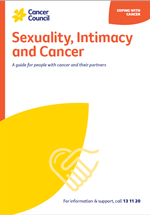- Home
- About Cancer
- Managing side effects
- Sexuality, intimacy and cancer
- Overcoming specific challenges
- Early menopause
Early menopause
Natural menopause occurs when your ovaries stop working and you no longer menstruate (have periods). This means you will not be able to fall pregnant naturally. For most people, this usually happens between 45 and 55.
Learn more about:
- Menopausal symptoms
- Effects of menopause
- Treatments that can cause early menopause
- Tips for managing menopause symptoms
Menopausal symptoms
Most menopause symptoms are related to a drop in your body’s oestrogen levels. Symptoms may include aching joints, mood changes, hot flushes, night sweats, trouble sleeping, a dry vagina, reduced libido, dry or itchy skin, increased urinary frequency and “fuzzy” thinking. However, some people have few or minor symptoms. However, some people have few or minor symptoms.
Effects of menopause
Early menopause (premature ovarian insufficiency or POI) is the term for menopause that occurs before the age of 40. When this happens because of cancer treatment, it may be called induced menopause. When menopause starts suddenly, the symptoms are usually more severe than natural menopause because your body hasn’t had time to get used to the gradual loss of hormones. Premature menopause may also cause bones to weaken (called osteoporosis or osteopenia).
Going through menopause earlier than you expected may affect your sense of identity, or make you feel older than your age or friends. You may feel less feminine, and worry that you are not as attractive. For some people, not having periods is a positive.
Treatments that can cause early menopause
Many kinds of cancer treatments can result in menopause symptoms or early menopause.
These treatments include:
- surgery in which both of your ovaries are removed
- hormone therapy to decrease your body’s production of oestrogen
- radiation therapy and chemotherapy, which may affect your ovaries’ ability to produce eggs and hormones.
If your uterus is removed (hysterectomy) you will no longer have monthly periods or be able to carry a child. However, if you still have at least one ovary, you will continue to produce oestrogen – which means you will go through natural menopause at the normal stage of life. If both of your ovaries and/or your uterus are removed, your periods will stop and you will experience a surgical menopause.
Learn more about fertility issues and tips on coping with a dry vagina caused by menopause.
Tips for managing menopause symptoms
- If cancer treatment causes early menopause, consider seeing a menopause clinic to discuss the options for managing symptoms.
- Identify and avoid things that trigger hot flushes, such as alcohol, hot drinks, spicy foods or anxiety.
- Learn meditation and relaxation techniques, and exercise regularly to reduce stress and symptoms.
- Try topical hormone treatments, such as vaginal creams, to manage symptoms. There are also non-hormonal options, such as acupuncture.
- Talk to your doctor about the benefits and risks of menopause hormone therapy (MHT) for severe menopause symptoms.
- Ask your GP to arrange a bone density test to check for osteoporosis or osteopenia, which can develop after menopause.
- Try to eat high-calcium foods, talk to your doctor about a supplement, and exercise regularly to strengthen your bones and reduce bone loss.
Call Healthy Bones Australia on 1800 242 141 for more information.
Podcast: Find Calm During Cancer
Listen to more of our meditation and relaxation podcast
More resources
Dr Margaret McGrath, Head of Discipline: Occupational Therapy, Sydney School of Health Sciences, The University of Sydney, NSW; Yvette Adams, Consumer; Dr Kimberley Allison, Out with Cancer study, Western Sydney University, NSW; Andreea Ardeleanu, Mental Health Accredited Social Worker, Cancer Counselling Service, Canberra Health Service, ACT; Kate Barber, 13 11 20 Consultant, Cancer Council Victoria; Dr Kerrie Clover, Senior Clinical Psychologist, Psycho-Oncology Service, Calvary Mater Newcastle, NSW; Maree Grier, Senior Clinical Psychologist, Royal Brisbane and Women’s Hospital, QLD; Mark Jenkin, Consumer; Bronwyn Jennings, Gynaecology Oncology Clinical Nurse Consultant, Mater Health, QLD; Dr Rosalie Power, Out with Cancer study, Western Sydney University, NSW; Dr Margaret Redelman OAM, Medical Practitioner and Clinical Psychosexual Therapist, Sydney, NSW; Kerry Santoro, Prostate Cancer Specialist Nurse Consultant, Southern Adelaide Local Health Network, SA; Simone Sheridan, Sexual Health Nurse Consultant, Sexual Health Services – Austin Health, Royal Talbot Rehabilitation Centre, VIC; Prof Jane Ussher, Chair, Women’s Heath Psychology and Chief Investigator, Out with Cancer study, Western Sydney University, NSW; Paula Watt, Clinical Psychologist, WOMEN Centre, WA.
View the Cancer Council NSW editorial policy.
View all publications or call 13 11 20 for free printed copies.
Need to talk?
Support services
Coping with cancer?
Speak to a health professional or to someone who has been there, or find a support group or forum
Life after cancer treatment
Webinars, exercise and nutrition, sexuality programs, and back-to-work support
Cancer information
Your coping toolbox
Strategies for managing difficult situations during and after cancer treatment
View our publications
Guides and fact sheets for people with cancer, their families and friends

